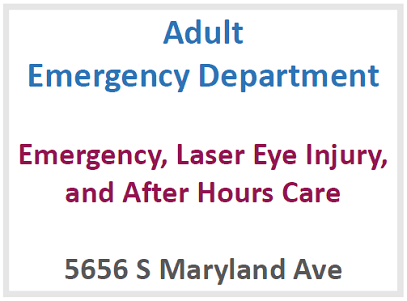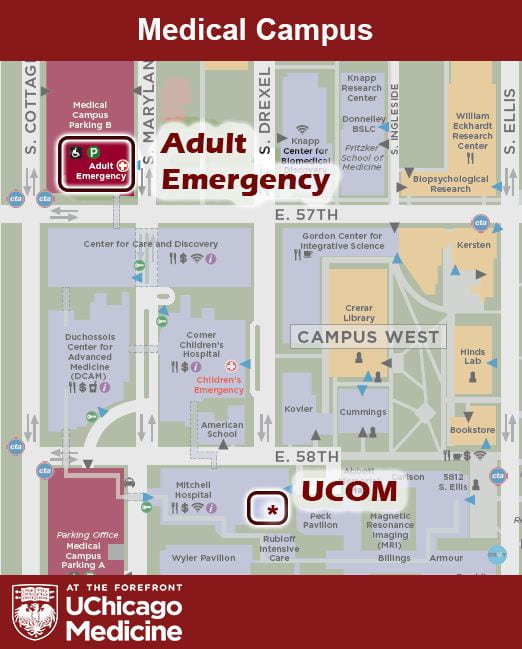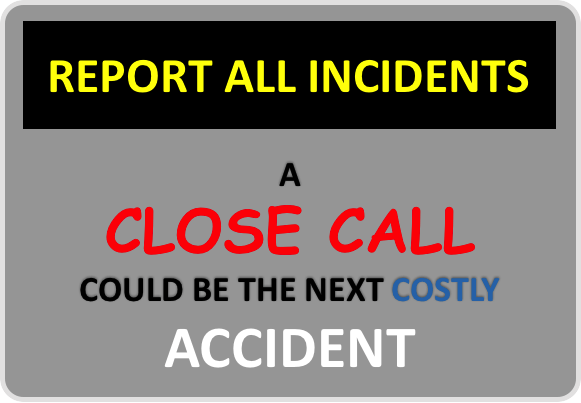Why does the University need an accident/incident reporting system?
The University of Chicago is committed to the safety of every member in our community. Your active participation in reporting any accidents or incidents is crucial for us to achieve this goal.
To facilitate this communication, the UCAIR system is designed to improve the current paper-based reporting system by:
- Making accident/incident reporting accessible to anyone from anywhere (e.g., UChicago Webpage, Departments/EHS/ORS Homepages, and mobile application);
- Enabling involved individuals, supervisors, affected persons, and event witnesses to easily submit accident and incident reports;
- Allowing anonymous reports to be submitted;
- Allowing for immediate notification of EHS/ORS so that a root-cause analysis can be initiated promptly;
- Facilitating communication through standardized reports;
- Allowing for automatic distribution of forms to designated parties;
- Ensuring the proper regulatory agencies are notified within the required time-frame;
- Providing data for tracking metrics around accidents and incidents;
- Accelerating identification and refinement of safety best practices across campus (e.g., laboratories, machine shops, mechanical rooms, offices, etc.) to proactively mitigate risk.
What is an "Accident", and what is an "Incident"?
An accident is an unanticipated or off-normal event that results in injury, illness, environmental release/impact, or significant property damage.
An incident (i.e., close call or near miss) is an unanticipated or off-normal event that has the potential to escalate to accident status.
Why should someone report an accident/incident?
It is your right to a safe working environment, and it is also your shared responsibility to create and maintain it. All accidents and incidents should be reported in order to:
- Ensure proper medical care is provided, and documentation is established for workers’ compensation when applicable;
- Trigger prompt root causes analysis to initiate and support corrective and/or preventive actions;
- Establish written records of information about the circumstance for reinforcing a better course of action for prevention of future accidents/incidents;
- Provide statistical data that will help lead to the prevention of accidents and incidents;
- Fulfill the Occupational Safety and Health Act (OSHA) reporting requirements for occupational injuries and illness;
- Fulfill the Environmental Protection Agency (EPA) reporting requirement for environmental releases.
How do I know whether or not to report something?
There will be no negative consequence for reporting. If you are unsure, go ahead and report. All accidents and incidents should be reported no matter how slight they may appear. Accidents happen for a reason. Reporting of incidents provides an opportunity to prevent future accidents. Reporting of accidents helps identify the cause and prevent future re-occurrence.
If you see something, say something! If in doubt, report it!
What are some examples of the minimum threshold for events that I must report?
Yes, below is a list of the examples:
| Category | Examples |
| Injury |
|
| Fire |
|
| Animal |
|
| Biological |
|
| Chemical |
|
| Laser |
|
| Radiation |
|
| Environmental Release |
|
| Equipment |
|
| Property Damage |
|
Can reports be submitted anonymously?
Yes, anonymous reporting is available for events that do not require medical treatment. If you are reporting anonymously, please be as detailed as possible to ensure we can locate the area to determine the root cause leading to the accident and/or incident.
If I hear about an accident/incident but did not observe it personally, can I still report it?
Yes, please provide as much detail as possible to facilitate an analysis of the event. You can report anonymously if you choose.
If I submit a report to UCAIR, does it notify UCPD?
No. The UCAIR tool only sends an e-mail to the safety offices.
In the event of an emergency, your first call should be to 123 (on-campus phone) or 773.702.8181 (off-campus phone) to ensure proper emergency response procedures are triggered. (i.e., UCPD is engaged, page goes out to on-call engineer and on-call safety officers in EHS and/or ORS).
Could there be consequences for me as a submitter?
No, as long as the report is submitted in good faith. You are protected by University of Chicago’s Whistleblower Policy (U103), which states:
“The University relies on its employees to perform their duties and responsibilities in accordance with the University’s policies and procedures. The University provides various mechanisms to assist and encourage employees to come forward in good faith with reports or concerns about suspected compliance issues. Employees may report suspected non-compliance issues without fear of reprisal or retaliation.”
If a report is submitted anonymously, and there are consequences for individuals involved, will they be informed as to who submitted the report?
The identity of the person submitting the report remains anonymous in the reporting system. Sometimes, however, based on the nature of the report or description of facts, identities can be inferred, such that complete anonymity cannot be absolutely guaranteed.
Confidentiality is one of our top priorities, and so the identity of the individual, if known, will only be shared on a need-to-know basis. If you feel you will be harassed or feel you have witnessed unethical behavior, you can report these matters to the Whistleblower hotline, 800.971.4317.
Should I or someone still submit a report via the UCAIR system after dialing 123 or 773.702.8181?
Yes. In the event of an emergency, dial 123 (on-campus phone) or 773.702.8181 (off-campus phone).
The University of Chicago Police (i.e., not the City of Chicago Police Department) will respond immediately and inform EHS and/or ORS. Submitting a report via the UCAIR system after calling the UChicago Police is highly encouraged. This will provide additional information for EHS/ORS to initiate the investigation process.
The form can be filled out and submitted by a witness.
What happens after I submit a report?
A report entered into the UCAIR System will automatically activate the following procedures:
- Sending a notification to EHS;
- Sending a notification to the Office of Research Safety (ORS) if the accident/incident occurs in a research lab;
- Initiating root cause analysis, if necessary;
- Assisting Risk Management in the preparation of filing a claim for worker’s compensation benefits if the involved personnel is a University employee injured while performing a work-related task;
- Assisting Risk Management as they quantify property damage and manage events that result in insurance claims.
Will every accident and incident be investigated, what will my involvement be in the process?
All accidents will be investigated as well as most incidents.
For accidents, the initial root cause analysis will begin immediately. In order for this to occur, you must call 123 (on-campus phone) or 773.702.8181 (off-campus phone) to alert UCPD Dispatch who will page the appropriate safety office.
After calling UCPD, please submit or have your colleague submit a report via UCAIR. Incident reports submitted to UCAIR outside of normal business hours (8:00 am – 4:30 pm) will trigger a root cause analysis the following business day.
The investigations are to identify the root cause of the events and to obtain lessons learned with the intention of sharing these lessons with the community. While your time is valuable, your cooperation in the analysis of accidents and incidents is critical. Non-anonymous reporters will be asked to answer a few questions regarding the accident or incident. The investigation report and any lessons learned will be sent to relevant parties for their feedback. You may also be asked to implement some recommendations from the investigation report to prevent similar accidents/incidents from happening again.
If I work in a Medical Center building on campus, does the reporting process change?
Yes. The UCAIR system should be used only by University employees.
If you are a Medical Center employee, call Public Safety at 773.702.6262 to report all emergencies within the Medical Center. Use the University of Chicago Medicine’s Custom Maintenance Software (CMS) System and follow the reporting procedures outlined on the CMS website.
For information about Medical Center workers’ compensation, please visit the Hospital HR website.
What are the consequences of accidents/incidents going unreported?
In addition to the possible human costs, accidents and incidents cost money and consume valuable resources and time. In research situations, accidents and incidents can significantly hinder scientific progress. Learning from previous accidents and incidents is the best way to prevent future re-occurrence.
Unreported accidents and incidents discovered afterwards can result in the following adverse outcomes:
- Missing a lesson-learned;
- Lack of documentation supporting workers’ compensation benefit claims;
- Violation and/or fines applied to the University for failure to report injuries and/or environmental releases to regulatory agencies within the specific time limits;
- Putting in jeopardy research funding for individual investigators or across the University if the work involves recombinant DNA (NIH Guideline violation).
What are some examples of the costs associated with not reporting accidents/incidents?
Failure to report the release of a hazardous chemical or oil/petroleum product before it reaches the treatment facility may result in local and state fines of as much as $37,000 per day, plus the cost to decontaminate the treatment facility.
Failure to notify OSHA in the event of a “Reportable” injury to an employee within the 8- to 24-hour time frame can result in a minimum fine of $7,000.
Where can I find data regarding the frequency and impact of workplace and laboratory accidents/incidents?
- University of Chicago data: If you are a department or division lead you can request access to the UCAIR tracking dashboards for your unit. Contact Environmental Health and Safety (non-lab) or the Office of Research Safety (research lab).
- National data and trends: US Bureau of Labor and Statistics
What is the difference between UCAIR and UCARE?
UCAIR is a system for submitting a report about an accident or incident that occurs on campus.
UCARE is the University of Chicago Alcohol Risk Reduction Education Program that is managed by Student Health and Counseling Services (SHCS).
Does UCAIR replace the Whistleblower hotline?
No. Please use the University’s whistleblower hotline, 1.800.971.4317, to report unethical or inappropriate behavior.
When should I not use the UCAIR system?
The main goal of UCAIR is to eliminate preventable injuries and significant accidents that impact University operations/facilities on a large scale. UCAIR is not intended to replace existing work request systems that manage building maintenance issues, complaints, or routine safety requests.
Do not use UCAIR to report:
- crimes
- small pipe leaks
- condensation
- musty odors
- mold/mildew
- nuisance odors related to food/cooking
Contact Facilities Services (773.834.1414) or Physical Plant (773.702.6295) for all building related maintenance issues and the appropriate safety office for routine safety work requests, Environmental Health and Safety (773.702.9999) for Non-lab related issues, and Office of Research Safety (773.834.2707) for Lab related issues.
Where can I find how to apply for workers' compensation?
For information regarding workers’ compensation, please visit HR Benefits.



